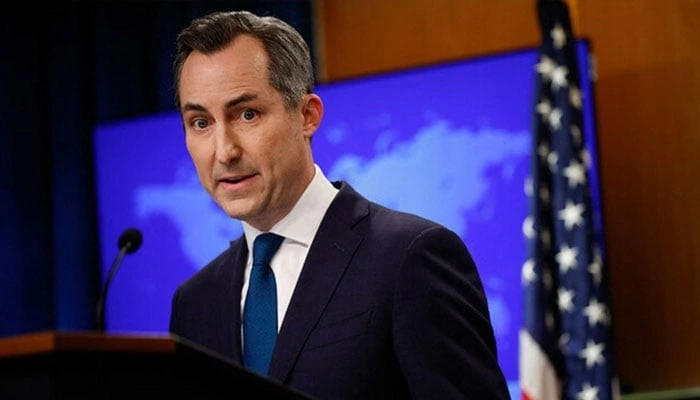Israel Has Committed War Crimes in Gaza
 Israel Has Committed War Crimes in Gaza
Israel Has Committed War Crimes in Gaza
Matthew Miller, a Biden administration US State Department spokesman, has shockingly and controversially admitted that Israel had engaged in war crimes in Gaza. This disclosure has rocked the international diplomatic community since it is a rare example of a high-level US official giving in to Israeli misbehaviour in a crisis under international notice and censure.
Miller, who had already denied any Israeli misconduct in formal press conferences, explained that his former remarks had a purpose given his position. “At the time, my job demanded me to follow the official policy line,” he stated in a recent interview. “I couldn’t adequately convey the whole scope of what we knew inside.” His comments underline the often-political character of diplomatic contacts and the conflict between institutional allegiance and personal ethics.
Miller’s remarks coincide with mounting worldwide concern about Israel’s military operations in Gaza, which started in reaction to the October 2023 Hamas attacks. Originally presented as a counterterrorism campaign, over time this has developed into a full-scale siege of Gaza. Independent observers’ and humanitarian organizations’ reports have repeatedly shown extensive damage, the employment of excessive force, and an increasing civilian death toll.
Adding to the chorus of worry, two days before Miller’s admission Tom Fletcher, the leader of the UN aid effort, delivered a sombre interview. Fletcher said categorically that Israel committed a war crime by blocking food deliveries into Gaza. He said that this type of collective punishment—which essentially starves the civilian population, is both cruel and blatantly illegal according to international law.
“Starvation as a method of warfare is illegal under the Geneva Conventions,” Fletcher added. “Israel let a meagre supply of food last week; three months before that, there was a total siege. That is a war crime, trying to starve a population. He underlined even more the terrible discrepancy between the actual realities and international standards. “There are food mountains waiting at the borders, but inside Gaza people, millions of people, are starving.”
These comments have significant ramifications. Consistently offering diplomatic cover at the United Nations and billions of military aids, the United States has been Israel’s strongest partner for decades. At least in some spheres of the international community, an admission from a former top State Department official that Israel has committed war crimes could alter the tone of political debate.
Particularly the Fourth Geneva Convention, international law forbids using starving as a weapon and targeting civilians. Furthermore, forbidden is the destruction of necessary infrastructure unless there is a strong military need. Documented extensively in Gaza are the damage of hospitals, schools, power plants, and water supplies. Human rights groups including Doctors Without Borders, Human Rights Watch, and Amnesty International have regularly denounced Israeli operations as collective punishment and possible crimes against humanity.
The ground conditions in Gaza are appalling. The UN and other humanitarian organizations estimate that more than eighty percent of Gaza’s infrastructure has been either damaged or destroyed. Hospitals either are non-functional or overburdened. One does not find much clean water. Particularly for youngsters, malnutrition rates are soaring. Once rare diseases are now fast spreading from poor sanitation and overcrowding. Tens of thousands of people have died and many more have been injured; most of them are civilians, hence the human cost is almost incomprehensible.
The Israeli government insists that its military activities are aimed and required to eradicate Hamas. It says that any infrastructure damage or civilian casualties are accidental outcomes of Hamas utilizing people shields. For many foreign viewers, though, who note the scope and constancy of the harm, this defence has become thin. The methodical character of the embargo and airstrikes begs grave questions regarding the proportionality and legitimacy of Israel’s acts.
Miller’s admission sharpens the conflicts and concessions inherent in foreign policy. His job as a government spokesman was to offer the official story, one that sometimes glossed over or ignored disturbing truths directly. But his latest comments imply that the matter was seen within somewhat differently. His decision to speak out, even after leaving office, adds legitimacy to claims made by activists and foreign observers for years.
Response to his remark have been quick and divisive. Celebrated as a breakthrough, human rights organizations have urged the U.S. government to review its policies and stop military support to Israel awaiting a thorough inquiry. Some Congressmen have responded to this appeal, contending that the United States is culpable since ongoing assistance in the face of credible war crimes accusations makes the country. On the other hand, government officials and pro-Israel activists have denounced Miller’s comments as reckless and endangering of national interests.
Officially, the Biden team has not replied to Miller’s remarks. Still, the problem of Gaza has already split the Democratic Party. Progressive legislators have attacked the government’s relentless support of Israel, especially in view of growing civilian losses. Youth-led demonstrations and grassroots groups have demanded an instant ceasefire and a stop to military aid, therefore exerting great political pressure on Democratic leadership.
Globally, the tide seems to be shifting as well. Several European nations, including Ireland, Norway, and Spain, have lately formally acknowledged a Palestinian state. These symbolic acts show a larger disenchantment with the so-called peace process and a rising belief that justice for Palestinians cannot be attained with current systems predominated by Israeli and U.S. interests.
Insiders like Matthew Miller have great weight in this changing terrain. They underline the requirement of responsibility and give credibility to long-standing worries. War crimes—no matter who does them, must not be overlooked or disregarded if the world is to maintain the standards of international law.
The Gazaites still go through terrible agony. Although remarks made by previous authorities and UN officials would not alter the ground truth overnight, they give optimism that the truth is emerging. It is yet unknown whether this will result in specific action. Clearly, though, silence is no longer a choice.








